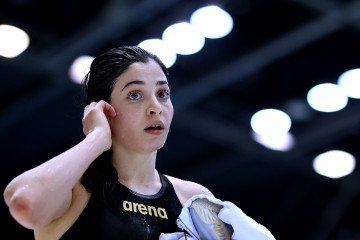

Have you ever had a nightmare so horrific that you felt relief when you woke up? When you’re about to die but your body jumps and suddenly, you’re home and safe?
What if it wasn’t a dream? What if you found yourself in the middle of unforgiving, perilous waves fighting for your life with no one there to help you?
"The Swimmers shows us their inspiring story, which led to Yusra showcasing her swimming skills on a global stage by competing for the refugee team at the Rio 2016 and Tokyo 2020 Olympics"
For Syrian, professional swimmer sisters Yusra and Sara Mardini, this was their cold, brutal reality, as they phenomenally saved themselves and 18 other refugees in the Aegean sea after fleeing their war-torn country to Germany in 2015 in search of a better life.
The sisters’ incredible story, told in the film The Swimmers – out on Netflix on November 23 – shows us their inspiring story, which led to Yusra showcasing her swimming skills on a global stage by competing for the refugee team at the Rio 2016 and Tokyo 2020 Olympics.
It also depicts a heart-warming full circle moment, in which Sara decides to pursue humanitarian work in Lesbos, Greece – where she first arrived on European land – to help refugees arriving in the same way she did.
It is important to note Sara was detained in 2018 for her humanitarian work on charges of spying and smuggling – charges Amnesty International has described as "trumped up".
A Greek court adjourned the case in November 2021, however, if convicted, Sara could face a prison sentence of up to 25 years.
Capturing realities and breaking false perceptions
"I am really happy with the way the film portrays me and my family," Yusra, who is also a UNHCR Goodwill Ambassador, tells The New Arab.
The film captures the harsh realities of becoming and living as a refugee, including the exhausting and dangerous journey many Syrians have taken as they fled to Europe. Yusra is therefore sure that its "accurate" representation, will impact Western perceptions of refugees for the better.
"There’s a certain idea in the Western world about what a refugee is… when we say the word refugee they imagine someone coming from the Sahara desert with a tent they lived in and that is very sad," she said.
"We come from Syria, we have lots of amazing culture, we have great food, an amazing education, and most refugees had jobs, some were doctors, engineers, artists, athletes… and we did love our country, but we left because of war and violence, not because of the luxuries of life," she adds.
"I really hope people understand we’re normal. We’re just coming here because we want peace, I don’t want my mum to cry her eyes out every time we have to leave the house because she doesn’t know if I’m going to come back,” Yusra highlighted.
Being degraded, dehumanised and exploited
Unfortunately, after leaving all that they knew behind in the hopes that humanity would embrace them, Yusra and Sara soon learned that such degrading perceptions of refugees had dangerous consequences.
"It is very confusing because without them, we have a much smaller chance of crossing but with them, we also have a high chance of dying… they’re inhumane to me, they’re profiting from us… they did not really care about us living or dying"
The Swimmers captures their first dehumanising encounters of such, including their experiences with people smugglers. These are individuals who smuggle vulnerable refugees across treacherous seas and borders – where they could turn back – for large sums of money. Ultimately, they use refugees’ desperation to escape war as a business.
"It is very confusing because, without them, we have a much smaller chance of crossing but with them, we also have a high chance of dying… they’re inhumane to me, they’re profiting from us… they did not really care about us living or dying," Yusra said.
"I think we would have found a way with or without them… maybe… without them, it wouldn’t happen… but we’re a number to them and it’s heartbreaking to know thousands of people are crossing every day, and [smugglers] don’t know if they’re alive or dead and are fine with it," she stated, adding that the smugglers "do not just have the power out of nowhere… let’s just say that".
White-passing privilege and trying to look 'less foreign'
The exploitation and discrimination the Mardini sisters faced as refugees also lead them to consciously try to look more 'European'.
The Swimmers shows this during a scene at a beach club, chillingly, by the Aegean Sea that almost killed them. The fair-skinned, brunette sisters are seen changing from their battered clothes into new, more 'fashionable' and revealing choices. This allowed them to enter the beach, blend in and finally be able to take a shower after their punishing journey.
Due to their white-passing privilege, the sisters could pull such instances off more successfully than others might have been able to. When asked whether she believes this influenced the opportunities given to her in the West, including a chance to join the Olympics, Yusra explained that even if she looked more 'Arab' by Western standards, she would have "pushed harder" – like other successful visibly Arab or Muslim women – to ensure her dreams came true.
"I was so determined to go to the Olympics, and be who I wanted to be, let’s say they were going to push me back if I wore hijab… I’m a person who is very stubborn, so probably because of that I would have pushed more and done more, even if it was difficult for me, I would have still got my way," she told The New Arab.
"I was so determined to go to the Olympics, and be who I wanted to be, let’s say they were going to push me back if I wore hijab"
'You don't look like you're Syrian... or like a refugee'
As a refugee, Yusra did push against the odds to achieve a place in the past two Olympic games, but as she leads a very different life to the circumstances she faced seven years ago, she says people today are surprised to learn of her ethnicity and background.
"Now I know people who are like, 'oh you don’t look Syrian'… what does that even mean?" she tells The New Arab, discussing the diversity of Syrians.
The Levantine country contains a varied mix of dark and light-skinned and haired individuals, with Syrians being known as the 'lighter Arabs' of the region, many of whom have blonde or red hair.
"In general, there’s a misconception about what a Syrian is supposed to look like and we are so passed that point. What should I do, wear a scarf head to toe?" she asks, highlighting Western ignorance and recalling times she was also told, "you don’t look like a refugee".
Challenging the white-saviour complex and championing accurate representation
Hopeful that The Swimmers will help to correct such misconceptions, Yusra believes the film also challenges ignorant media representations of POC (people of colour) stories centred on the white-saviour complex, whereby white characters are transformed into overly glorified protagonists.
"People are becoming bored now with this [idea of a] prince charming," she said, referring to the complex of romanticised Western heroism.
She also expressed her delight and pride that the film was created through an Arab lens, alongside Arab talent, highlighting that real-life Lebanese sisters Nathalie and Manal Issa, who played her and Sara "did a great job".
"I think it definitely helped that they’re Arabs… they understand what we went through even if they didn’t go through it," Yusra said.
Many well-renowned Arab actors, including Syrian Kinda Alloush and Egyptian Ahmed Malek, were also featured in the film.
In addition, director Sally El Housaini has stressed that The Swimmers had refugees produce for and act in the film, to ensure it authentically told and honoured refugees’ stories.
|
A changing media landscape still requires 'caution'
With new minority voices being heard and showcased across Western media, Yusra believes the media landscape "is slowly starting to change".
"I think it’s really changing… there are so many new stories to be told," she said.
However, she warns the public to exercise caution when consuming media, as she noted that divisive media reporting and portrayals have also contributed towards prejudice against Arabs and refugees, listing the degrading difference in coverage between Arab and Ukrainian refugees in Western news outlets.
"It is the media that wants to divide people… that is the wrong media coverage… do not watch and believe everything the media portrays, it’s not always true, choose wisely what you listen to, choose wisely what you watch. I think that’s the most important thing," Yusra stressed.
As she continues to use her platform to be a voice for refugees, seven years on from her traumatic journey to the West, the inspiring young woman has recognised her growth and strength.
"I was me and I’m still me, the only thing that has changed about me is I’m more open-minded – I can speak better, I know exactly when to say yes and when to say no, and I know how to defend my people and speak for all refugees all around the world," she told The New Arab.
It is clear that the Mardini sisters' story is a unique, inspiring and deeply moving one, and that their unshakeable resistance to all life throws their way is something everyone can learn from.
Aisha Aldris is a staff journalist at The New Arab.
Follow her on Twitter: @aishaaldris








 Follow the Middle East's top stories in English at The New Arab on Google News
Follow the Middle East's top stories in English at The New Arab on Google News


